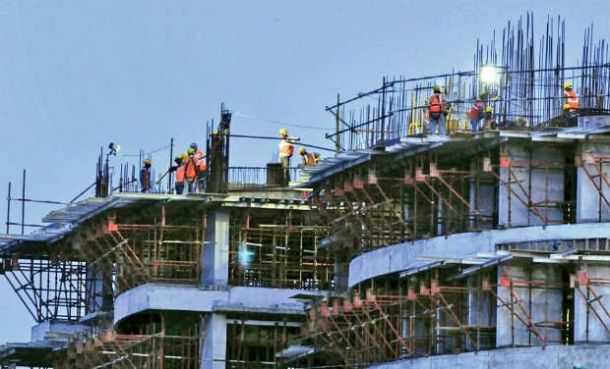The construction industry is on the warpath. Companies are uniting for a common cause and have threatened a strike on January 20, 21 and 22 if the issues they have raised in a charter of demands submitted to the Chief Minister on January 6, are not redressed.
This is the first such strike threat since the formation of the Confederation of Construction Organisations (CCO) led by the Confederation of Real Estate Developers’ Associations of India (CREDAI).
Coming under the CCO umbrella are Kerala Builders Association, Licensed Engineers and Supervisors Federation (Lensfed) which has 10,000 members, Tipper Lorry and Earth Movers Association which has 30,000 members, Borewell Diggers Association which has 600 members and associations of painting and concrete contractors.
“There are several issues plaguing the construction sector. One is the rise in the price of raw materials which affects consumers directly. Our main demand is to give industry status to the construction sector, which provides crores in taxes to the state exchequer and employs 15 lakh people,” said S N Reghuchandran Nair, chairman of CREDAI-Kerala and CCO.
CCO has also demanded that there should be a state level Construction Industry Development Council (CIDC). There is one at the Central level and also in other states.
“One way to bring down the price of key raw material like cement and steel is to start companies to produce them in the government and co-operative sector and sell the products at competitive prices, which will force private companies to lower their prices,” said Kerala Builders Association chairman and CCO convener, T Padmajan.
He said that non-resident Indians (NRIs) can be encouraged to start companies in the state to produce raw materials for the construction sector.
He said that in the case of cement alone here has been an increase in price of Rs 40 per packet in the past one year. Steel has gone up by Rs 6 per kilogram whereas the price of river sand has gone up 100 per cent.
Issues affecting the construction sector are spread across different ministries – Industries, Local-Self Government, Labour, Finance, Irrigation, Home, Electricity, Registration, Environment and Mining and Geology.
The CCO, predictably, is against the Kasturirangan report which seeks to rein in quarrying in the Western Ghats.
It says that 70 per cent of quarries have stopped functioning which has resulted in scarcity of sand and metal, making these more expensive.
Another issue raised by the industry is the menace of middlemen in the labour sector.
“A majority of the labour is migrant labour. We pay them Rs 600 per day. But what they get in hand is Rs 300 to Rs 350. The remaining R 250-300 is cornered by middlemen who arrange for the labour, taking advantage of their ignorance in the local language and circumstances,” said Reghuchandran Nair.
In the past three years, property registrations in the state have come down significantly.
Procuring sand biggest challenge
The Confederation of Real Estate Developers Association of India (CREDAI) finds a clear stagnation in the construction industry in the past one year with the key reason being the restriction on sand procurement.
With the inflow of sand through legal sources virtually drying up, the majority of sand comes through illegal sources priced as high as Rs 20,000 per load.
Real estate developers say the hike in prices of raw materials has virtually made it impossible for them to run the business profitably. With the prices going up, the demand in the housing sector has gone down.
According to M A Mehaboob, president of the Kozhikode unit of CREDAI and a director of the Hi-Lite Builders, the overall slowdown in the economy and heightening interest rates, the retrogressive tax policies of the state government and controls on procurement of raw materials have hit the construction sector in 2013.
“The government introduced restrictions on sand procurement without taking into account the impact on the consumer. Now, undesirable elements are ruling the roost”, he said.
“Although the overall picture is still gloomy we expect a positive change in coming days with the projected easing off of bank interest rates and overall growth momentum in the economy,” he added.
The only new project launch worth talking about in Kozhikode during 2013 was the announcement of Rs-400 crore residential villa project by Sobha Developers, said a source in the real estate sector.
Source: Deccan Chronicle
